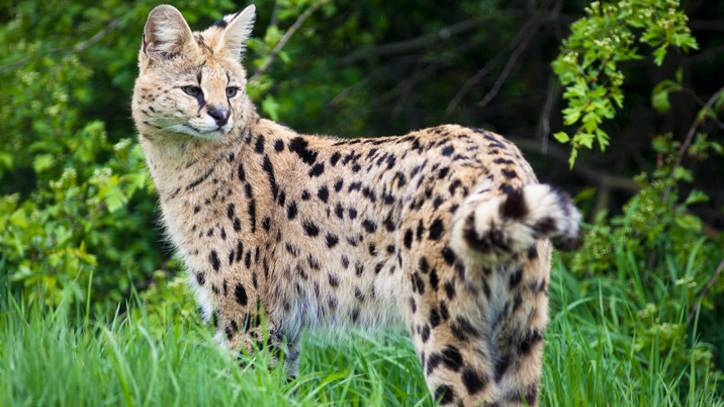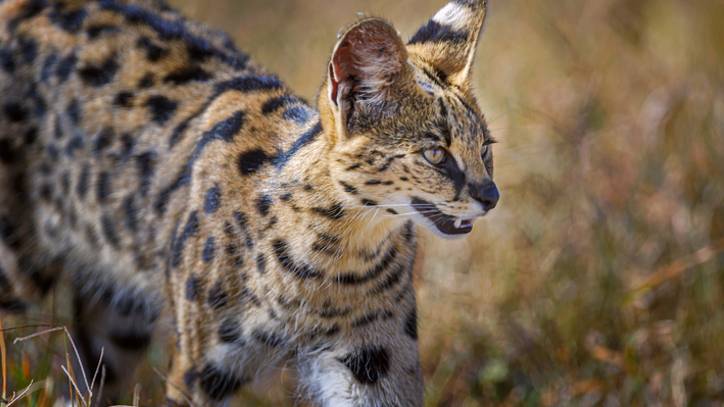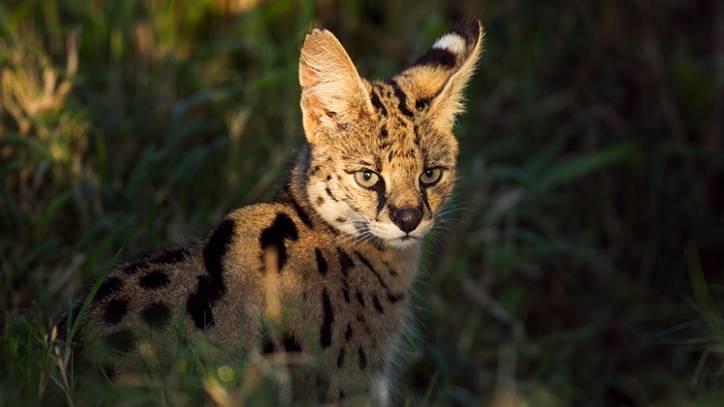Serval cats: Can you keep as a pet? History, care and breed information
Serval cats are certainly attention-getting and unique, but can they make good pets?

In recent years, there has been a renewed interest in the serval cat, and other wild or exotic species, as potential pets. Many people admire these cats in zoos and in the wild and wonder if purchasing a serval would be an appropriate way to bring a bit of wildlife into their own home.
While serval ownership may sound like a good idea in theory, there are a number of factors to consider before purchasing an exotic cat. These cats have unique needs, which differ significantly from the needs of domesticated cats. Additionally, there are a number of legal regulations to take into account with this species. Read on to learn more about servals, and exotic cat ownership.
- 9 of the rarest cat breeds in the world
- Best outdoor cat enclosure: Keep your feline safe while it explores the outdoors
- 10 longest living cat breeds
What is a serval cat?
Servals are wild cats that are native to many parts of Africa. In their natural habitat, they roam savannahs and wetlands while hunting small prey. They can reach up to 40 pounds in size, have high energy levels, and are quite adept at climbing trees to hunt and escape predators.
While these exotic cats may look similar to our domesticated pet cats, they are not domestic animals. Domestic cats have lived with humans for long periods of time, being gradually bred for a greater comfort level around people over many generations, but that is not the case for servals. Servals may act somewhat domesticated if raised around humans but, at their core, they are still wild animals.

History of the serval cat
In their natural habitat in Africa, serval cats are solitary predators. They live alone, defending a large territory against other servals.
Ancient art and historical records indicate that servals were kept as pets by the early Egyptians. During the last century, breeders again developed an interest in servals. Some individuals began breeding these cats, and promoting them as pets. In an effort to increase the appeal of servals, they were bred with domestic cats to create a new breed, the Savannah cat.
Is owning a serval cat legal in the US or UK?
Life expectancy: 20 years
Average weight: Male: 30lbs/14kg, Female: 25lbs/11kg (about the same size as a Beagle or Cocker Spaniel)
In the United States, your ability to own a serval will depend on the state and county in which you live. Servals are considered wild animals; therefore, they’re subject to the laws and rules governing wild animal ownership.
Get the best advice, tips and top tech for your beloved Pets
Some states completely prohibit serval ownership, while others allow it without restriction. Other states only allow serval ownership with proper licensing and registration.
In the United Kingdom, it is illegal to own a serval without special permission from the authorities.
Does a serval make a good pet?
Servals should not be confused with domestic cats. These are wild animals, and should be regarded as such. While servals may develop an attachment to their primary owner, they are often shy and fearful of strangers or visitors. They do not tend to be aggressive, but they can be unpredictable in some contexts.
Unlike domestic cats, which live in our homes, use a litter box, and eat commercial cat food, housing a serval is more similar to managing a zoo animal. Servals are typically housed in outdoor enclosures, and require a diet of rodents, fish, and other whole animals. It is unlikely that your serval will curl up in bed with you, or sleep on your lap while you watch television.

Serval cat care
Servals require veterinary care, but many general practice veterinarians do not treat wild animals. Therefore, you will need to find a suitable exotic animal or wildlife veterinarian in your region who will treat your serval. It may be difficult to find a veterinarian willing to work with a serval, but proper veterinary care is an essential component of responsible ownership. Find a reliable veterinarian who is willing to treat your serval before you consider adding a serval to your home.
A serval should be housed in a large, outdoor enclosure. These solitary cats are very active, and need plenty of room to run and climb. They climb fences and dig, so your enclosure must be completely fenced on all sides and the roof and the sides should extend several feet underground. The enclosure should also contain a large circulating water fountain, to provide a place for your serval to drink and swim.
Serval cats require a varied and diverse diet. Commercial cat food will not meet their unique nutritional needs. Instead, aim to vary your cat’s diet between live rodents and seafood. Live rodents can be released directly into your serval’s enclosure, and live seafood can be dumped into their water fountain.
What is the difference between a Serval and a Savannah cat?
A Savannah cat is a cross between a serval and a domestic cat. This cross was made in an attempt to create a “domesticated” version of the serval. However, it’s important to note that these are still considered exotic cats.
The legality of owning a Savannah cat will depend upon your location. First-generation (F1) Savannah cats, which have one serval parent and one domesticated cat parent, are often regulated similarly to servals.
Owning an F1 Savannah cat is illegal in many parts of the United States, as well as in the United Kingdom. Second-generation or F2 Savannah cats, which have two Savannah cat parents, are often regarded as less “wild” and there may be fewer restrictions regarding their ownership.

Risks of owning a serval cat
Servals are wild animals, and they are not small in size. They can pose a significant safety risk to people and other pets. You should avoid purchasing a serval if you have children or small pets in your home.
Servals are also very active and they can be destructive. If you allow your serval inside of your home, expect that you may find your sofa cushions destroyed and your curtains pulled down. Additionally, servals use urine to mark their territory, so they may urine mark your home, your personal items, and even you. Outdoor enclosures are the best place for a serval.
Conclusion
While serval cats are gorgeous animals, they should not be confused with domestic cats. Serval ownership requires an attitude that is less that of a pet owner, and more that of a zookeeper. If serval ownership is legal in your area, begin by determining whether you have access to an exotic animal veterinarian.
Next, carefully consider whether you are willing and able to construct an appropriate enclosure and purchase live prey for your serval. If you have reservations about these aspects of serval ownership, you would likely be better served by seeking out a domesticated cat breed.
Dr. Barnette is a graduate of the University of Florida, where she received both her B.S. in Zoology and her Doctor of Veterinary Medicine (DVM). She has 15 years of clinical experience as a small animal veterinarian, treating dogs, cats, and occasional exotic patients. She now works as a freelance veterinary writer, creating educational content for veterinarians, veterinary team members, and dedicated pet owners. Dr. Barnette lives in southwest Florida with her husband and daughter (plus two cats, a dog, and a rescued dove!) and enjoys kayaking, biking, and hiking. Learn more about Dr. Barnette at www.linkedin.com/in/catherinebarnette.

